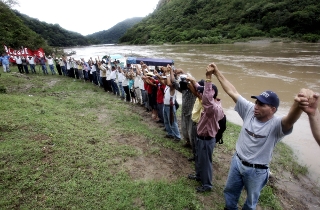 [By Eniko Horvath on Business-humanrights.org] Now is the time to secure a fast and fair transition to a low-carbon economy by ensuring renewable energy does not compromise the lives and rights of local communities.
[By Eniko Horvath on Business-humanrights.org] Now is the time to secure a fast and fair transition to a low-carbon economy by ensuring renewable energy does not compromise the lives and rights of local communities.
Earlier this year Berta Cáceres, a prominent indigenous community leader opposing a hydropower project (Agua Zarca) in Honduras, was killed in her home, eliciting an international outcry from government leaders and civil society alike. Investors, including the Dutch development bank FMO, initially emphasised the value of the Agua Zarca dam project in reducing Honduras’ reliance on fossil fuels by providing “a clean, low cost and stable source of energy”. After weeks of public pressure around security concerns and claims of inadequate consultations, investors including FMO suspended their involvement in the dam project.
This week marks the first review conference of the Paris climate agreement. Last December, governments committed to act to mitigate the impacts of climate change – many of the world’s largest companies joined the chorus with commitments to go 100 per cent renewable. According to Bloomberg New Energy Finance and the UN Environment Programme, investment in renewable energy reached a record high of $285.9 billion in 2015 and is growing.
Berta Cáceres’s death serves as a warning to ensure that our well-intentioned drive for renewable energy does not come at the cost of lives and livelihoods of communities affected by new energy projects. Wind and hydropower projects from Mexico to Kenya have been linked to alleged abuses related to land rights, impacts on livelihoods, and indigenous peoples rights, among other concerns. Whilst the Paris climate agreement underlines the need to safeguard human rights as we combat climate change, many renewable energy projects are promoted as climate solutions with little attention paid to human rights.
Last month, Business & Human Rights Resource Centre contacted 35 companies in the wind and hydropower sectors to ask them about their approach to human rights. The responses show that most companies have the basics in place: overall, two thirds have human rights policy commitments. However, only half of the companies referred to international standards in their human rights policies.
Similarly, two thirds of companies have some commitment to consulting with local communities affected by their projects. However, only three (Engie, Lake Turkana Wind Power and Vestas) commit to the internationally recognised standard to ensure indigenous peoples’ rights are fully respected in their consultation process: free, prior and informed consent.
The wind power sector’s gaps in transparency around commitments to community consultations are particularly apparent. Half of the wind power companies we contacted do not disclose information on their community engagement policies and practices. Moreover, despite being among the leading players in the wind power market globally, neither of the Chinese wind power companies we contacted disclose any information about their community engagement.
Even when commitments are in place, the extent to which they are implemented remains contested. Lake Turkana Wind Power Project, in charge of developing what is expected to be the largest wind power facility in Africa, states that it follows lender guidelines that require the company to undertake free, prior & informed consent if it adversely affects indigenous peoples. However, the company’s feasibility study did not recognise the pastoralist communities affected by the project as indigenous, thus exempting it from observing this standard. Although the company holds that it has undertaken extensive consultations with local communities, community-based organisations contest their adequacy, citing land rights concerns and detrimental impacts on traditional culture and livelihoods. Local communities filed a lawsuit against the company in October 2014.
The hydropower sector has similar challenges in policy implementation. Last year, International Rivers benchmarked the top Chinese overseas hydropower companies on their social and environmental practices and found that companies often fail to translate broad commitments to international standards to the project level. Implementation of public commitments was also an issue in the Agua Zarca case in Honduras. Investors in Agua Zarca claim they obtained the consent of affected indigenous peoples. Yet, local groups allege that the dam project had not carried out adequate consultations.
Renewable energy companies are not alone: governments, local and international civil society, and investors all play a part in ensuring human rights are at the core of climate solutions. Other sectors can also offer some good practice examples and common ground to discuss implementation challenges. For example, Oxfam America’s Community Consent Index shows that the mining sector has taken strides in committing to free, prior and informed consent, although it has a long way to go to implement these commitments on the ground. Moreover, a recent study by the Harvard Kennedy School found that a clearer articulation and improved analysis of the costs of conflicts with local communities in the extractive sector could lead to a more robust community engagement approach.
It has taken the extractive sector decades to start integrating human rights into their business operations – and they are still far from perfect. As our future energy providers, the renewable energy sector has the opportunity to embed human rights at its core at a key moment to ensure a fast and fair transition to a truly clean source of energy.
To look at infographic, click here.
Posted on Business-humanrights.org on May 18, 2016
